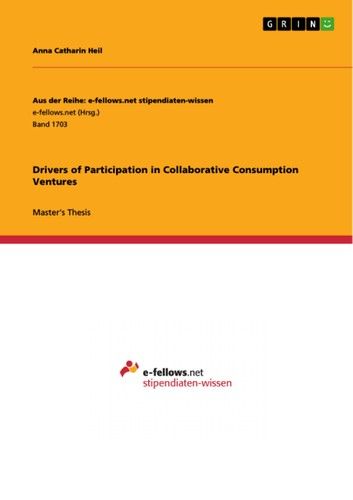Master's Thesis from the year 2014 in the subject Business economics - Marketing, Corporate Communication, CRM, Market Research, Social Media, grade: 8,5 (NL); 1,3 (GER), Maastricht University (Maastricht School of Business & Economics, Maastricht Center for Entpreneurship, NOVA Business School), language: English, abstract: Collaborative Consumption is a term used to describe the notion of sharing and joint utilization of goods and services. Being deeply rooted in anthropology, the phenomenon of joint consumption is currently experiencing a form of renaissance on the internet, as online communication is beginning to lower the hurdles of geographical, social and emotional distance associated with sharing activities of an individual's direct social circle. Although evidence suggests that the collaborative consumption market bears huge profit potentials, little research seems yet to have been conducted to foster the understanding of people's motivation to engage in such sharing networks. To address this gap, the following research study reviews the literature on a diverse set of academic fields such as consumer behaviour, sharing, anthropology, sociology and increasing returns, based on which proposition are presented aimed at clarifying the influence of selected factors on people's sharing behaviour. Grounded on these propositions, the study provides a conceptual model designed to improve the understanding of people's motivation to actively participate in collaborative consumption ventures. In this context, special focus is set on the supply of goods in 'pure' sharing systems in which no immediately observable exchange takes place. In an attempt to expose the assumptions made to preliminary scrutiny, focus group research has been conducted with frequent users of the Dutch collaborative consumption network Peerby. Findings suggest that there seems to be interaction effects between different constructs, as individuals tend to consider them jointly rather than independently when deciding whether to engage in sharing or not. Furthermore, the need for development of richer definitions of constructs used, to aid better understanding of potentially influential factors and set a solid basis for future theory testing, is uncovered.












